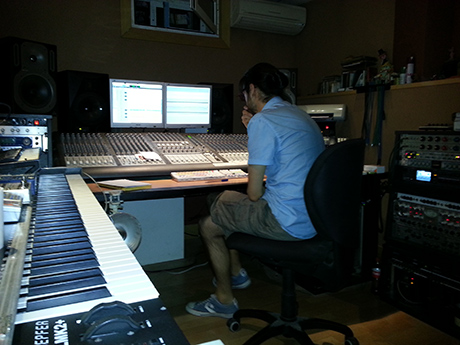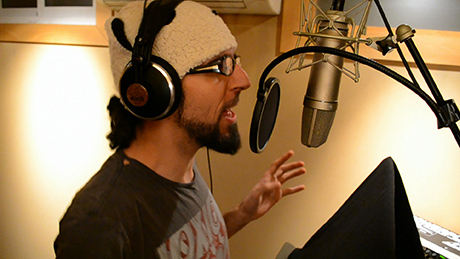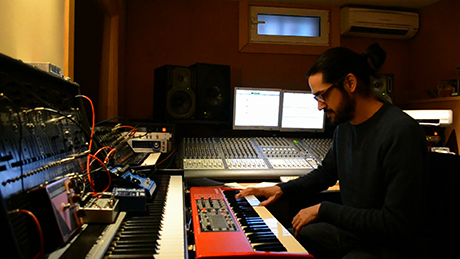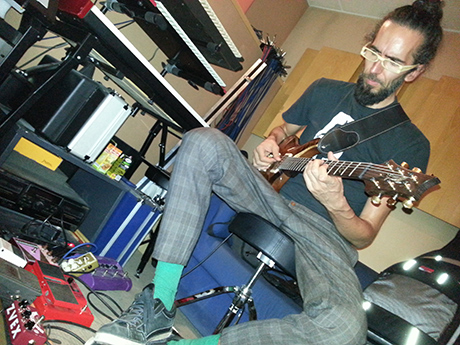An
interview with
Lorenzo Matellán & Razl
(Beluga)
----------------
By Beppe Colli
Feb. 11, 2014
"What a nice surprise! Here's a CD
featuring creative music which sounds fresh and full of life - a combination
that's quite uncommon these days -, said album coming all the way from Spain
(will wonders ever cease?)."
This being the opening passage of my review of Architecture
Of The Absurd, which interested readers can access right here on Clouds and
Clocks, said album being discussed at great length.
Meanwhile, I was very curious to know more about the duo, so
I decided to get in touch with them: Lorenzo Matellán, on keyboards, synths,
and engineering; Razl, mostly on guitar and vocals.
And so, last week, I sent my Qs via e-mail.
"Mucho thanks" to Carolina Mateo, my
"linguistic intermediary" for a Spanish interview... in English.
As a first topic of our conversation, I'd
like you to talk about the way your new album, Architecture Of The Absurd, took
shape. Since I assume that many compositional ideas were finalized in the
studio, I'd like you to talk about this stage, too (which, given the complexity
of the music, and the abundance of instrumental and vocal layers, must have
been quite a strain in financial terms!).
We're lucky because Lorenzo Matellán owns a recording studio where we made most
of the work. The composition process never followed a system. Most of the
material was composed by Razl and was completed with ideas coming from studio
improvisations like sketches Lorenzo came up with.
So again, we were very fortunate to have the studio available without having to
think about time or external pressure. We were free to work around, for
example, the vocal character and harmonies and sculpt synthesizer sounds or
apply effects during mixing on drums or bass. This gave us some peace of mind
and helped the music a lot (although the music can be sort of crazy sometimes).

I'd like to know how you came to choose
Damian Erskine and Marco Minnemann as the featured players for your album.
The first idea was to contact Marco. At
first we had our own drummer in the band, but because of musical differences he
left the project and we spoke about contacting Marco almost as a joke, as he is
probably one of the best drummers we could think of for a project like this. We
sent him some of our demos through Bryan Beller (who had already worked on
Razl's album Microscopic) and we were extremely surprised when he said he liked
it and he was willing to record with us. So we set out to give the most
detailed tracks we could. There was even a song that we wrote on the same week
Marco began the recording.
Our next move was to contact Damian who had also previously collaborated on one
of Razl's albums. He is a great musician and a great guy, and he offered to
record his parts without hesitation.
The challenge for us was living up to these two great musicians. In our opinion
they have actually improved our ideas, but they knew exactly what they had to
do because they dominate these styles so perfectly.
I'm also curious about the practical conditions when it comes to their
playing on the album: were they given written parts, and complete arrangements,
in the form of digital files? Did they record their contributions at your
studio? And how did you manage to integrate so successfully their contributions
in your "sound"?
Once we decided the songs for Marco and Damian to be recorded, we prepared the
material as perfectly as we could. You can say that our "demos" were
exact copies of what you hear on the CD, but without drums or bass (just with a
very detailed programmed bass and drums). All the arrangements were there; only
the vocals were still in a gibberish language, but with harmonies included, as
this was a very important aspect to understand the songs.

Next we wrote the
parts with the harmony and mandatory elements, and let the musicians be as free
as they wanted to. That's why we think the music sounds so natural, the freedom
to perform the way they liked... without ties.
I seemed to detect a certain similarity of parts of your album to the music
of such names as Frank Zappa, Mike Keneally, and Gentle Giant (and odd time
signatures in general, as something peculiar to "Prog"). But
"detecting a similarity" does not necessarily imply "finding
one's influences". So, who do you regard as being an influence when it
comes to the music on this album?
Our influences are very diverse, not only from "Prog", but of course
Frank Zappa and Gentle Giant are examples we've heard hundreds of times and of
course they show themselves in our music. Actually our only aim was to enjoy
everything and create themes completely free from complexes or conditions. Over
time, it seems like many musicians tend to calm down and soften, but our case
is just the opposite. We enjoy ourselves more with a dirty sound, with a
surprise factor, with changing atmospheres and with the unusual. We could make
a long list of groups or musicians who encourage us, but we would never finish
it...
I'd really like to know more about your individual musical trajectories up
to now.
Lorenzo has been a tireless seeker of "no one knows what". His first
bands, The Teagarden and The Flame Proof Machine were influenced by progressive
psychedelic music from the late sixties and improvisation (Syd Barrett's Pink
Floyd or the early Soft Machine) but over the years he has been developing
different musical genres, composing, producing and recording several records of
Funk, Nu-Soul or even Hip Hop, to feel somehow that he must come back to the
beginning. He worked in bands like Guateque All Stars and produced artists like
Ikah, along with his work as a sound engineer with the band Single (awarded in
2011 as the best live sounding band in Spain).

Razl started in Prog and Rock-Funk related bands, Living Colour style. He has
been combining the study of the guitar with composition for audiovisuals:
cinema, animation and videogames. In 2008 he released his first solo album,
Rotonova, where you can find musicians like Mike Keneally, Bryan Beller or Dan
Brown, in a Jazz-Funk mood. In 2011 he released Microscopic, a power trio
record more focused on Alternative Jazz Rock, with Bryan Beller on bass. Both
records were exceptionally well received in specialized media.

Listening to Architecture Of The Absurd,
I'm almost sure there's a "concept", somewhere. I'd like to know more
about the album's "conceptual framework", the function of the lyrics,
and the way they are supposed to work in tandem with the music.
It is somewhat true that the album has a thread that links it all together.
What happens is that thread is quite complex because it is born out of our
"sick" minds, where of course it makes perfect sense, but we don't
believe the general public can understand that concept as such. The lyrics are
about real life experiences most of the times, but translated into our own
language. They can talk about moral and religion like in Sunny View, or about
the end of the world like in Thylacine, or panic attacks issues as in Under A
Black Cloud, but we try our lyrics to have a theatrical context, as a film
whose images are music and characters appear to tell a story, the actors.
Both of you appear to possess good technical skills. Once upon a time,
mastering one's instrument was considered a plus, and a certain number of those
who listened to music and attended concerts appeared to appreciate what could
be referred to as the "technical side" of music. Nowadays, audiences
don't appear to be so inclined. Judging from your experience, what's your take
on this?
We can't say what's the general public opinion, but sure we can talk about our
perception.
There was a time when technique seemed to be everything, to the point that the
technique eclipsed some of the talent distilled in some musicians (in our
humble opinion).
Of course it is very important to have the best knowledge on your instrument,
as it is with the music you are playing. As you learn more and acquire musical
tools, you will increase your composition and interpretation skills. But
technique isn't everything, attitude is a very important thing too and also the
way you use your knowledge (whether it's huge or small).
In our album, for example, there are some occasions where sounds or musical
ideas came directly by accident or even by chance, there's nothing about
technique there. We are aware that you need good technical skills to perform
some passages, but the point is to give these passages sense and emotion, not
pristine performance on every note.
We are attracted to these mistakes and accidents. We are human (sort of) and if
we feel the music sound "too perfect" then something's wrong for us.
In fact our performances are far from perfect, we don't want to lose this
essence.
As we know, yesterday's financial model is no more. So, what's in store for
musicians who want to be paid for their music? What kind of compensation scheme
do you foresee when it comes to your career in music, and music in general?
We've been working in the music industry for many years, for better or worse,
and we have directly witnessed the changes on the music business model. In our
opinion there are two ways of pursuing this: one is as a
"professional" musician, trying to make a living and therefore trying
to cover every style no matter what one enjoys. You have to be very good
technically, work hard and be very good at public relations. It's very
respectable, but it's not what we know how to do.
The other option is to make music, trying to enjoy as much as possible and to
strive to keep going. But above all it's about creating something that you can
be proud of. Finance this, making it known, it's a hard work too, but the few
benefits that it could give you are priceless.
Of course, everyone's idea is to get as far as possible, but music must be
above everything. For decades money has disrupted many things in the music
world, but maybe it is not so bad to think that right now this is something
more "handmade". It is very important to have an infrastructure that
will help you launch your creations, but it is more important to support your
creativity and not what a "hypothetical" public might expect from
you.
We don't know what the future of the music industry will be, but we do have the
feeling that it is still looking for something that has been lost, while lots
of bands are financed by themselves or rely on minority platforms run by people
who are passionate about music.
Who do you regard as doing good work right now when it comes to music?
(Also... architecture, and other arts, if you wish so.)
We are usually on track of the artistic styles we're interested in. Nowadays
the Internet is the perfect platform to discover all kinds of talents. People
with amazing creative capabilities that keep calling our attention. Musically
we find bands sometimes like the wonderful Man Man. Some other times we
discover bands with some work and records behind and we ask ourselves, how come
we didn't discover them before?
Lorenzo is into analog devices capable of making any kind of noises, and Razl
likes to find new ecologic alternatives and ways to be self-sufficient. Life in
general, with all its flaws and virtues, is our real inspiration.
The obligatory question about your projects and plans for the future.
Be millionaires, Prog Rock Superstars and travel around the Universe in
general. Meet the Klingons, ask them why Darth Vader became so bad if it wasn't
so (Princess Amidala was actually very good), travel in the Alien ship... well,
only as long as the Alien is still just a guy in a costume. Simple things.
© Beppe Colli 2014
CloudsandClocks.net | Feb. 11, 2014














